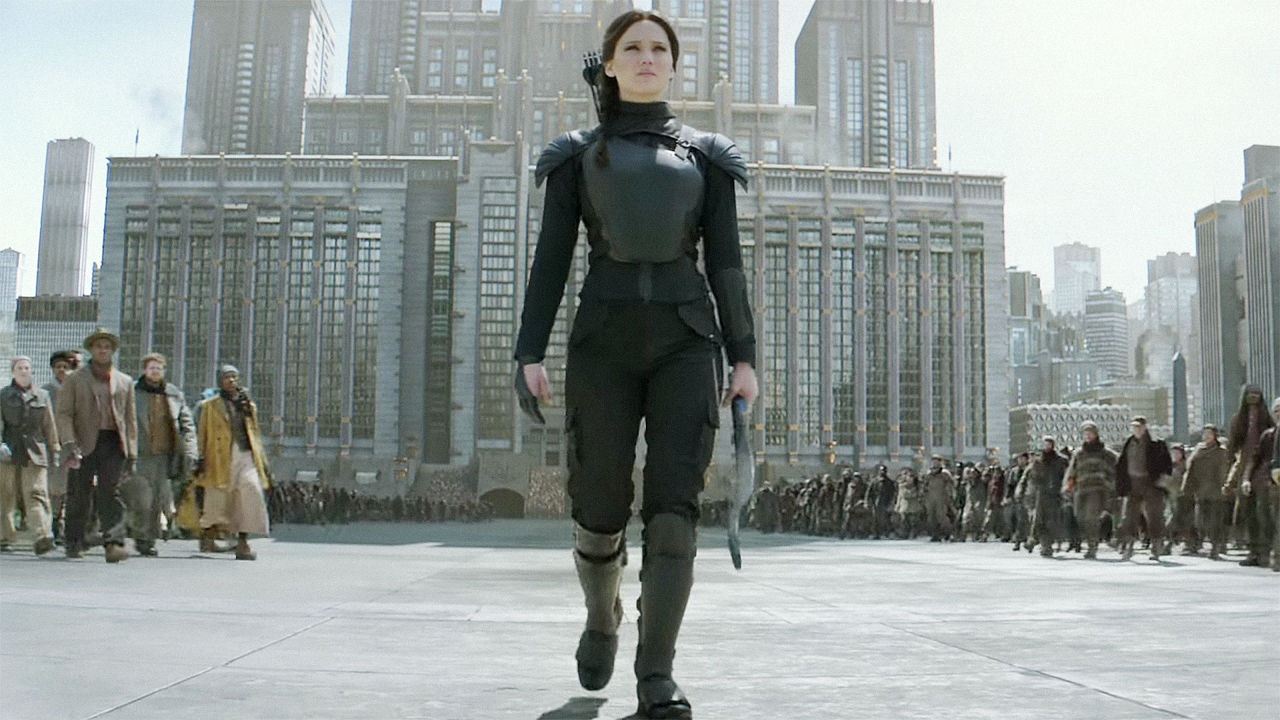
The Hunger Games: Mockingjay Part 2 closes out the film quadrilogy of the book trilogy. You might expect, with the final – and shortest book in the series turned into two movies because… money, that there would a lot of detail work (possibly some that wasn’t in the book’s climactic few days) and you’d be right (as Elizabeth Banks has noted in interviews, Effie Trinket was not a part of these events in the books…).
But the changes are small and, for the most part, seamless and the crux of the climactic film is that war may be fought for righteous reasons, but it is never good. In keeping with that idea, Mockingjay Part 2 is a dour, not quite dreary exercise in every respect.
Francis Lawrence actually directs with more economy than I was expecting – and the tone of the film – except for a couple of hard-earned moments at the very end, is extremely dark. Peter Craig and Danny Strong given us a script (taken from an adaptation by the book’s author, Suzanne Collins) and stayed true to its darkness every step of the way.
Battles are hard won; characters get few moments to rest and recuperate; even the final victory is a moral loss that’s only partially redeemed by the actions of Katniss Everdeen (Jennifer Lawrence).
There are two towering performances here, one of some length and depth, one of lesser length but not lesser depth: Lawrence’s Katniss always feels right, emotionally and physically – she’s heroic only because no one else recognizes the dangers the rebels are in even if they win; Julianne Moore’s President Coin says all the right things and makes all the right moves while never feeling emotionally true to those actions – she feels more and more like President Snow as the movie progresses.
Donald Sutherland’s President Snow continues to project genially steely evil with panache and when he voices his disappointment in Katniss (‘Katniss, Katniss… I thought we’d agreed to never lie to each other…’) it’s a devastating moment. The moment, in fact, that everything turns on in the end.
Josh Hutcherson almost matches the intensity of these performances as Peeta – who realizes that he’s not himself much of the time and would rather die than hurt Katniss again. And, once again, Gale (Liam Hemsworth) seems more like a plot device than a character, prodding or questioning Katniss as needed to keep her going.
Philip Seymour Hoffman is on screen just long enough to suggest that there’s more going on with Plutarch Heavensbee than meets the eye.
Francis Lawrence has maintained a bleak palette of greys and blacks and browns to amplify the effects of war on those in its midst. The cinematography makes wide shots look enclosed and closer shots beyond claustrophobic. The effects work is superb, but never relieves the darkness.
‘War is hell’ is a cliché because it’s been said so many times that the truth should be self-evident by now. Mockingjay 2 never lets the audience of the hook with some jingoistic finale. Like the book, it never glorifies the actions of either side – or any one individual. Almost all of the characters – and especially Katniss and Peeta – are marked for life by their experiences. Even in the few moments of relative happiness shown at the end, seen through a gauzy filter, there’s a shadow that Katniss acknowledges.
The Hunger Games: Mockingjay Part 2 wraps things up – though not with the nice, neat bow that many filmgoers hope for – well enough to make the series a worthy effort both as entertainment and as a statement. But Mockingjay Parts 1 and 2, while a solid end to the saga, take too long to make their points: they rack up a staggering 260 minutes where the two longer books required a combined total of 288. Padding? You betcha!
Final Grade: B